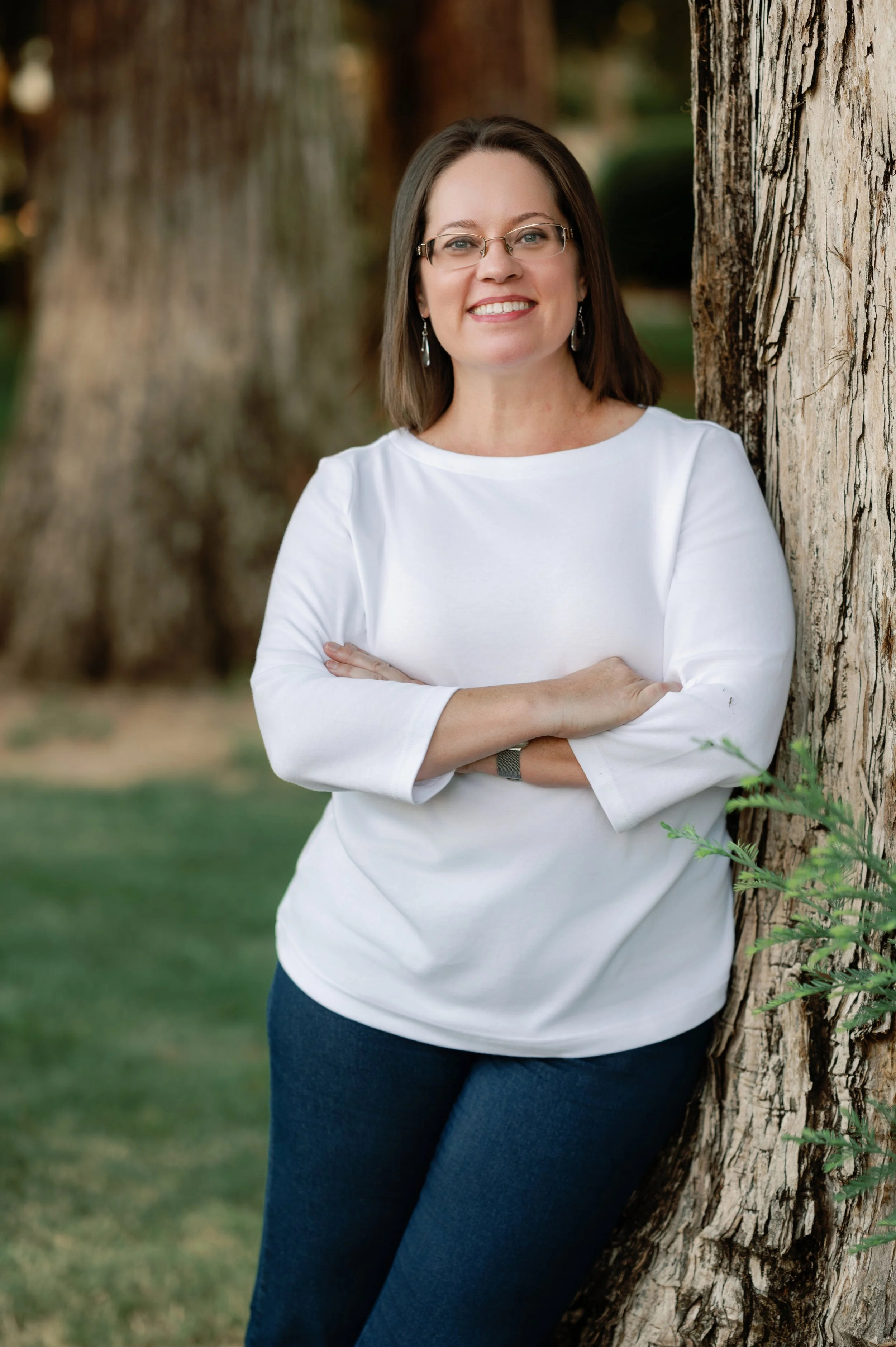
Therapy for Foster and Adoptive Parents in San Jose, CA
Serving San Jose, Sunnyvale, Santa Clara, Cupertino, and surrounding Silicon Valley communities
Online sessions throughout California | Licensed CA LCSW #68507
Trauma-Focused Support for Parents Navigating Adoption in San Jose
The paperwork is done. The home study passed. You did everything the agency asked.
But here's what nobody warned you about: the emotional aftermath of a birth mother changing her mind after you'd already started calling that baby yours, the hollow feeling that shows up after your child finally comes home instead of the joy everyone expects, the way your stomach drops every time your phone rings during a foster placement because you're terrified it's the caseworker saying they're moving your child.
You're exhausted in ways that have nothing to do with sleep. Your jaw stays clenched, your shoulders won't drop, and you find yourself holding your breath without realizing it. The happy family photos on your phone don't match the reality of crying in the Target bathroom or lying awake at 2am wondering if you've made a terrible mistake.
And the shame of admitting any of this feels unbearable.
What San Jose Adoptive Parents Experience
-
Post-adoption depression hits harder than you expected.
Between 10% and 32% of adoptive parents experience this, both adoptive mothers and fathers. Everyone tells you to be grateful, and you are grateful, but you're also deeply sad in a way you can't explain. You wake up dreading the day instead of excited to be with your child. You're going through the motions, posting Instagram photos, while feeling empty inside. The guilt about not feeling instant connection and blissful joy is crushing, and you're scared that admitting you're struggling means you shouldn't have adopted.
-
The failed adoption broke something in you.
You bonded with that baby for months, paid for the birth mother's expenses, went to ultrasound appointments, prepared the nursery. Then she chose to parent, which was always her right, but your heart wasn't ready for that disappointment. Now you’re grieving a child who was never legally yours. Months later, San Jose friends still don't understand why you're not "over it." The thought of trying again fills you with dread, but you still desperately want to be a parent.
-
Foster-to-adopt keeps ripping your heart out.
You showed up for every court date, drove to every supervised visit, loved that child with everything you had. Then reunification happened, which you know was the goal all along, but the grief is still overwhelming. You're stuck between wanting what's best for the child and mourning the family you thought you were building. Starting over with another placement feels unbearable.
-
Infertility grief didn't disappear when your child arrived.
You thought adoption would heal that wound. Instead, the grief surfaces at unexpected moments: when the pediatrician asks for family medical history you don't have, when someone comments your child doesn't look like you, when you wonder late at night if things would be easier with a biological child. You feel guilty for these thoughts, like you're betraying your child by grieving what never was.
-
Your child’s trauma triggers your own nervous system.
Their meltdowns send your body into fight-or-flight mode. You're walking on eggshells in your own home, never sure what will set off the next crisis. Some days you love your child but can't actually feel it through the numbness. The hypervigilance is exhausting, and you're starting to realize that witnessing your child's pain every single day is traumatizing you too.
Your Body is Keeping Score
You’re having anxiety attacks in the grocery store parking lot. You're snapping at your partner over nothing because your nervous system is maxed out. You're avoiding other parents because explaining your reality feels impossible. Their complaints about homework don't even register as problems compared to what you're dealing with.
The isolation makes it worse. You can't post honestly in adoption Facebook groups without risking judgment. Your friends who had biological children don't get it. Even your family keeps asking "but isn't this what you wanted?" like wanting to be a parent should erase every hard thing about how you got here.
Fatigue isn't just about sleep deprivation. It's the exhaustion of carrying multiple griefs at once: for the biological children you'll never have, for the birth families your child lost, for the imagined family life that doesn't match reality, for the parts of yourself you're losing in the constant crisis management.
The Problem With Regular Therapy for Adoption Trauma
You've probably tried traditional counseling. Your therapist was nice but kept giving you parenting advice when what you needed was trauma treatment for yourself. Or they focused exclusively on your child's healing with no acknowledgment that you're drowning too.
Maybe they didn't understand adoption at all, and you spent sessions educating them instead of getting help. Research shows 75% of adoptive parents rate their therapists as not adoption-competent; you're not imagining that gap.
Here's what's actually happening: talk therapy works great for processing thoughts and feelings, but when trauma lives in your body, when your heart races at the sound of your phone, when your chest stays tight for days, when grief feels physically heavy, you need approaches that work with your nervous system, not just your mind.
EMDR (Eye Movement Desensitization and Reprocessing)
Helps your brain file traumatic memories where they belong: in the past. That moment the adoption fell through, the day your foster child left, the first time you felt nothing when your child said "I love you" - we can process these so they stop hijacking your present. The memories stay, but your body stops reacting like they're happening right now. So you can think about difficult moments without your nervous system going into overdrive.
Accelerated Resolution Therapy (ART)
Can rapidly reduce trauma symptoms, often in fewer sessions than traditional therapy. It's especially effective for the intrusive thoughts and mental images that plague many adoptive parents. So you can get relief faster without years of weekly therapy sessions.
Body-Based Approaches That Help San Jose Adoptive Parents Heal
Brainspotting
Locates where trauma and grief are physically stored in your brain and helps release them without making you relive every painful detail. You don't have to retell the story over and over to heal from it. So you can process what happened without retraumatizing yourself in the therapy room.
Somatic therapy
Works directly with your body's trauma responses. Those shoulders holding hypervigilance, that chest carrying grief, that stomach churning with anxiety - we help your nervous system learn to regulate again. So you can actually feel calm in your own body instead of constantly braced for the next crisis.
Internal Family Systems (IFS)
Recognizes that you have different parts with competing needs: the part that loves your child fiercely, the part that's exhausted and wants to quit, the part grieving your imagined family, the part desperate to be a perfect parent. Instead of these parts creating internal war, they learn to work together. So you can stop beating yourself up for having conflicting feelings and make decisions from a place of internal alignment.
What Changes When You Get Real Help
Your nervous system settles. You develop tools to calm your fight-or-flight response when your child's behaviors trigger you. You’ll stay present during meltdowns without yelling back, make parenting decisions from clarity instead of panic, and actually enjoy family dinners without waiting for something to go wrong.
The depression lifts. Slowly but surely, you have more moments where you can access joy alongside the challenges. The numbness gives way to feeling again, both the challenging feelings and the good ones. You’ll be able to laugh at your child's jokes without it feeling forced, initiate sex with your partner instead of avoiding intimacy, and plan activities you enjoy rather than just surviving each day.
You process grief without drowning in it. Whether it's grief from failed adoptions, infertility, or the family life you imagined, you’ll be able to honor these losses without being consumed by them. The waves of sadness still come, but they don't pull you under. You’ll be able to talk about your adoption journey with friends without breaking down, fill out your child's medical forms without spiraling about the missing genetic history, and show up for Mother's Day or Father's Day events without feeling like a fraud.
Shame loses its grip. You understand that struggling doesn't mean you're failing, and needing help doesn't mean you made the wrong choice by adopting. You’ll be able to ask your partner for help without feeling like you're admitting defeat, tell your friends the hard truths about your experience without sugar-coating it, and set boundaries with your child's school or caseworker when you need to advocate for your family.
You sleep through the night. Your body is no longer on edge, and the 3am anxiety spirals happen less and less. Irvine parents I work with report waking up with actual energy to face the day, being able to focus at work without brain fog, and having patience for bedtime routines instead of snapping at their kids because they're running on empty.
You reconnect with yourself. Underneath the exhaustion and constant crisis management, you rediscover the person you were before trauma took over. So you can pursue hobbies you used to love, have conversations with friends about topics other than your child's struggles, and make decisions about your career or future that aren't just about survival mode.
Your capacity expands. Not through pushing harder, but through healing. When your nervous system isn't constantly activated, when depression isn't draining your energy, when shame isn't weighing you down, you have more to give. You’ll be able to show up for your child's therapy appointments and school meetings without feeling resentful, reconnect physically and emotionally with your partner, and respond to texts from friends instead of isolating.
Virtual Therapy in San Jose and Throughout California
I provide telehealth sessions for adoptive parents across California, including San Jose and throughout Santa Clara County. You can meet with me from your home, your car during lunch break, or anywhere you have privacy and internet access.
Session options:
50-minute sessions: $300
90-minute sessions: $450
4-hour intensives: $1,200
I offer flexible scheduling including early mornings, evenings, and weekends.
I'm a private-pay provider and don't take insurance directly. I can provide documentation (Superbills) for out-of-network reimbursement if your insurance plan offers it.
About Summer Verhines, LCSW, Adoption Therapist
I work with adoptive parents throughout San Jose and Silicon Valley because I understand that adoption doesn't just affect your child, it profoundly impacts you. I’ve been licensed to independently practice in California since 2015 (CA LCSW #68507). I have 9 years of experience in child welfare and adoption and I am C.A.S.E. registered (Center for Adoption Support and Education) through completing training with the National Adoption Competency Mental Health Training Initiative (NTI).
I specialize in supporting adoptive parents through their own mental health challenges: post-adoption depression, secondary trauma, and the grief and burnout that comes with this journey.
Using specialized trauma approaches, I help you heal from failed adoptions, process your own trauma responses, and find sustainable ways to manage the ongoing stress without losing yourself in the process.

Work With Someone Who Understands Adoption
You don't have to keep carrying this alone. You need someone with real experience in child welfare and adoption who understands the specific trauma of this journey; not generic advice, but expert help for what you're going through.
Let's talk about how body-based therapy can help you heal while you continue loving your child.
FAQs
-
All sessions are online through secure telehealth. You can meet with me from anywhere in California - your home, office, or even your car if that's the only private space you can find. For San Jose parents juggling work and family, this means no commute time and maximum scheduling flexibility.
-
Traditional talk therapy helps you understand your thoughts and feelings, which has value but often isn't enough when trauma is stored in your body. I use specialized trauma approaches - EMDR, Brainspotting, Accelerated Resolution Therapy, Somatic therapy, and Internal Family Systems - that work directly with your nervous system. These methods help your brain and body actually process and release traumatic experiences, not just develop coping strategies around them.
-
It varies based on what you're working on and which approaches we use. Accelerated Resolution Therapy is specifically designed for short-term work - many parents experience significant relief within just a handful of sessions when addressing specific traumatic memories like a failed adoption or placement disruption. Other parents work with me for several months to process multiple layers of adoption-related trauma. Traditional cognitive-behavioral therapy often takes years to see meaningful change - these body-based methods are significantly more efficient. We'll create a realistic timeline together in our first session based on your specific goals.
-
Absolutely. I work with adoptive parents at every stage of the journey: waiting to be matched, supporting a birth mother during pregnancy, recovering from a failed placement, navigating foster-to-adopt uncertainty, newly home with your child, or years into parenting. Your struggles matter regardless of where you are in the process.
-
I'm a private-pay provider because it allows me to focus on what actually helps rather than what insurance companies will reimburse. However, I can provide Superbills (detailed receipts) for out-of-network reimbursement if your insurance plan offers that benefit. Many adoptive parents find that investing in specialized trauma therapy actually saves them years of ineffective but insurance-covered talk therapy that doesn't address the root issues.
Contact Me
Please complete this form and I’ll be back in touch via email, text, or phone within 1-2 business days.
Call or Text
855-564-3338
sverhines.lcsw@gmail.com
Mailing Address
P.O. Box 28, Wilton, CA 95693
Services are 100% online

Also serving foster and adoptive parents in…
Therapy for Foster & Adoptive Parents in El Dorado Hills & Sacramento
Therapy for Foster & Adoptive Parents in Fremont & the East Bay Area
Therapy for Foster & Adoptive Parents in San Diego
Therapy for Foster & Adoptive Parents in Irvine & Orange County
Idaho: Coming Soon!
Maryland: Coming Soon!
